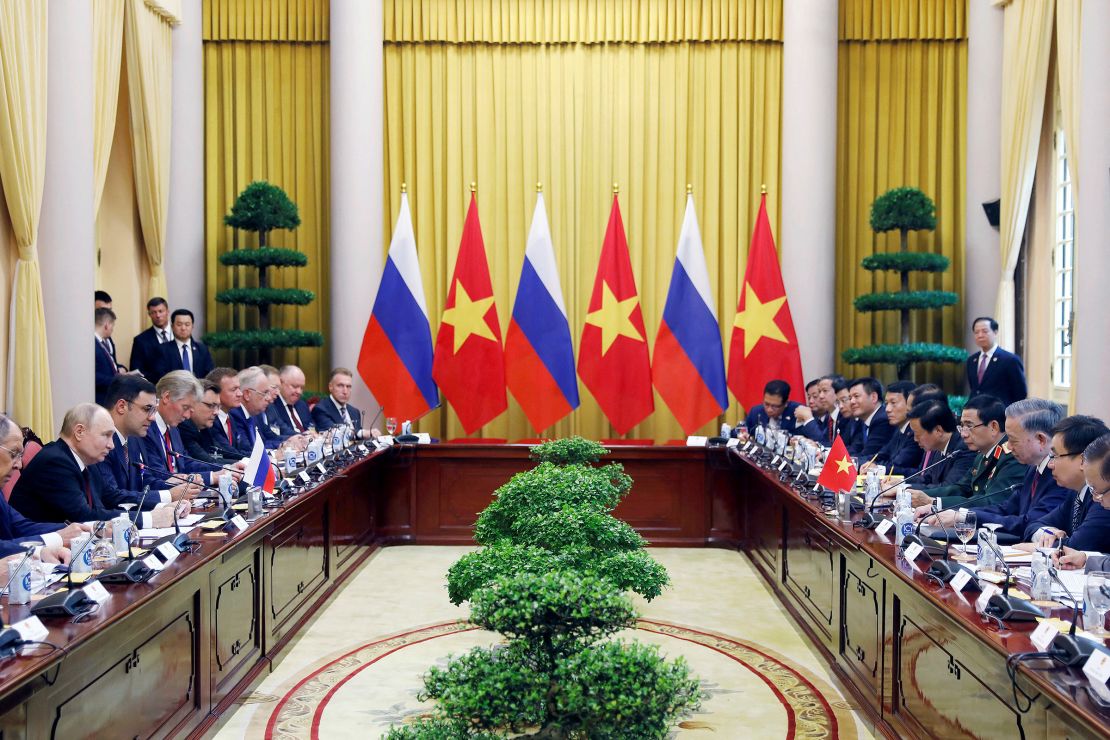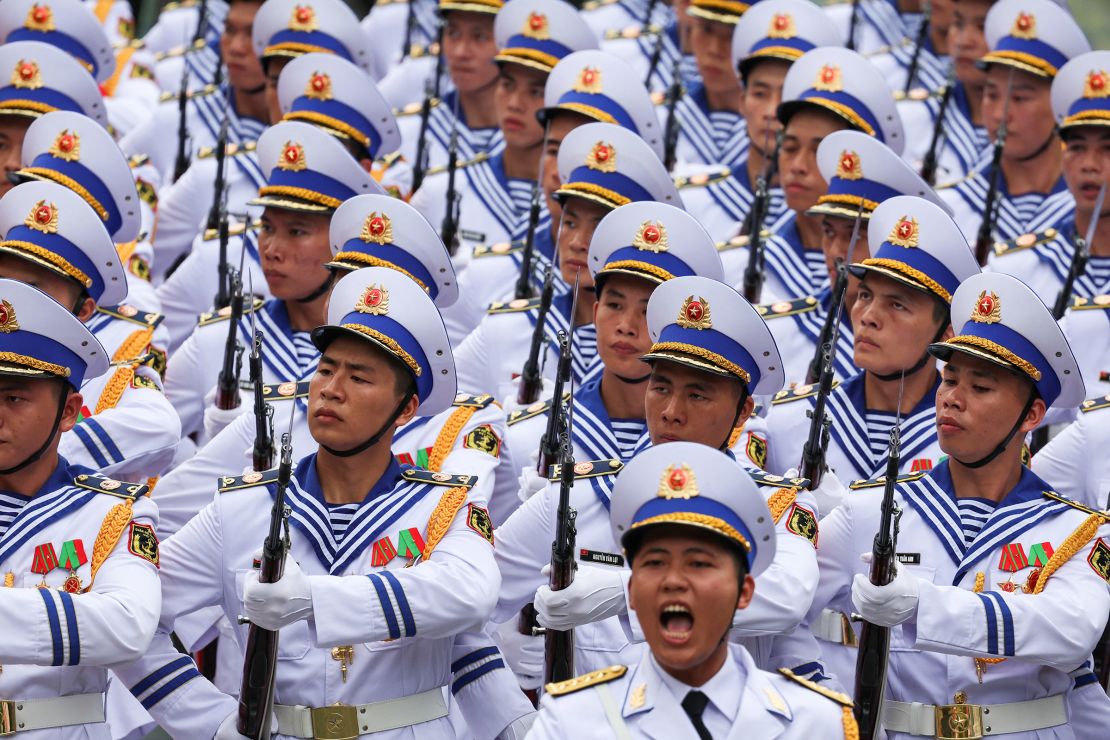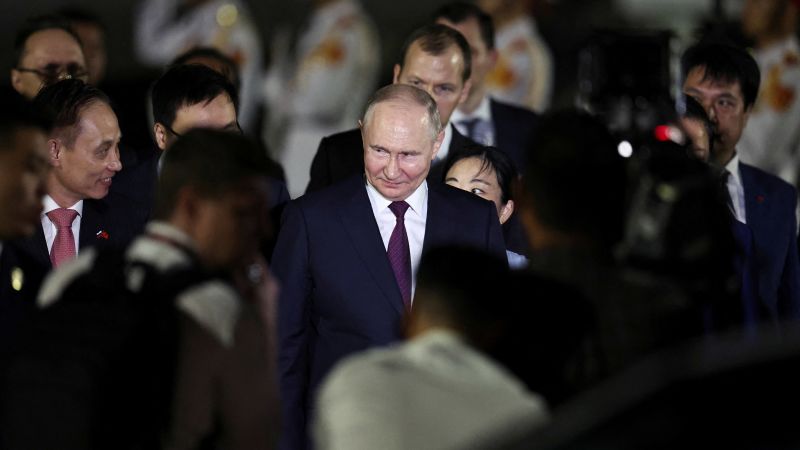CNN
—
Russian President Vladimir Putin arrived in the Vietnamese capital Hanoi on Wednesday, fresh from a rare meeting in North Korea with counterpart Kim Jong Un in which the two leaders agreed a new strategic partnership driven by Moscow’s need for weapons for its war in Ukraine.
Considered a pariah by the West, Putin is looking to boost economic ties with friendly countries and show that Western isolation is not having an impact.
Communist-run Vietnam appears to be a natural choice with its foreign policy of non-alignment and close historical ties to Moscow, and few countries can successfully host the leaders of the United States, China and Russia with such fanfare as Vietnam.
Putin’s two-day visit to Vietnam has rankled the United States, with a spokesperson for the US Embassy in Hanoi reportedly criticizing the trip saying, “no country should give Putin a platform to promote his war of aggression and otherwise allow him to normalize his atrocities,” according to Reuters.
The Russian leader met with Vietnamese leadership including Communist Party General Secretary Nguyen Phu Trong and new President To Lam, according to Russian state-run news agency TASS, citing the Kremlin.
Putin told Lam on Thursday that “strengthening a comprehensive strategic partnership with Vietnam is always one of our priorities,” TASS reported.
At the start of his talks with Lam, Putin invited him to Victory Day celebrations in Moscow next year. “We will be glad to welcome you to the celebrations marking the 80th anniversary of the Victory in the Great Patriotic War in Moscow,” TASS quoted Putin as saying.
Much like his visit to Pyongyang, Putin’s trip to Hanoi could signal deepening relations between the two nations as the Russian leader looks to garner concrete support amid international sanctions over his grinding war in Ukraine.
Ahead of the visit, Putin thanked Vietnam for its “balanced position” on Russia’s war in Ukraine in an article for the Vietnamese Communist Party’s official newspaper, according to the Kremlin.
“We are grateful to our Vietnamese friends for their balanced position on the Ukraine crisis and their desire to facilitate the search for practical ways to settle it peacefully. All of this is fully in line with the spirit and nature of our relations,” Putin said.
Vietnam’s Ambassador to Russia Dang Minh Koi told the Vietnam News Agency that the state visit will strengthen Hanoi-Moscow ties, and be “an opportunity for the leaders of the two countries to discuss and propose concrete measures to boost bilateral trade and economic cooperation,” TASS reported.
A joint statement is expected to be adopted and numerous agreements announced on cooperation in sectors including “trade and economic, scientific, technological and humanitarian areas,” according to Russian presidential foreign policy aide Yury Ushakov, TASS reported.
Moscow has been a major supplier of weapons to Vietnam since the Soviet era and analysts say arms and energy talks could feature on the agenda.
The visit also showcases Vietnam’s foreign policy balancing act, which like India, enables the country to be on friendly terms with rival major powers including Russia, the United States and China – all vital trading partners. Last year, Vietnam hosted both Chinese leader Xi Jinping and US President Joe Biden.
That trip resulted in the US and Vietnam upgrading diplomatic ties to a “comprehensive strategic partnership,” in a historic sign of improving relations between the former foes. The two nations have accelerated trade in recent years and the US is currently reviewing an upgrade to Vietnam’s market economy status that would allow Hanoi to benefit from lower tariffs on goods imported into the US.
Vietnam is center to US efforts to counter rising Chinese influence in the region and a key part of Washington’s Indo-Pacific strategy. Vietnam in turn is keen to benefit from American efforts to diversify supply chains outside of China as well as US concern over China’s military build-up in the South China Sea.

The two countries have built up their partnership just decades after fighting a devastating war that decimated the country.
“From the Vietnamese perspective, Russia is still seen as an important partner with deep historical ties and important roles to play in Vietnam’s defense and security policy,” said Le Hong Hiep, senior fellow of the Vietnam Studies Program at Singapore’s ISEAS – Yusof Ishak Institute.
But he said, “Vietnam is also careful not to be seen as being too close to Russia… The US and its allies play a much more significant role in Vietnam’s security and economic development.”
While Vietnam may risk disappointing the US and its allies by hosting Putin, “the country is showing its partners that Vietnam will not sacrifice its ties with one power just to meet the expectations of others,” said Le. “It is not about taking sides. It’s about maintaining its foreign policy of diversification and pursuing a strategy of autonomy.”
Putin faces an arrest warrant from the International Criminal Court (ICC) for an alleged scheme to deport Ukrainian children to Russia. Vietnam and Russia are not members of the ICC.
Vietnam was among several Southeast Asian countries that abstained from joining a global summit on Ukraine in Switzerland last week.
But Western hopes of an isolated Russia appear to not be bearing out as Putin ramps up his outreach to friendly countries and efforts to establish a new global order in opposition to the West.
In May, Putin met Xi in Beijing – his symbolic first overseas trip since starting a new term as Russia’s president – where the two leaders vowed to deepen their strategic partnership in opposition to the US.
Now, Putin is visiting two of China’s neighbors in what US national security spokesman John Kirby on Monday called a “charm offensive” following the leader’s re-election.
Crucially, Moscow assumed the rotating presidency of the China and Russia-backed BRICS economic group this year and will welcome member and observer nations to its southwestern city of Kazan in October.

More than three dozen countries are seeking entry into the bloc and Russia will be the first member to oversee the body since it significantly expanded its global footprint at the start of the year, when Iran, Saudi Arabia, the United Arab Emirates, Ethiopia, and Egypt formally joined.
For Moscow and Beijing, the expansion is widely viewed as a drive to forge a new world order by turning the loose economic grouping into a geopolitical counterweight to the West – and Western institutions dominated by the US, such as the G7.
Malaysia is the latest country preparing to join the group, according to Prime Minister Anwar Ibrahim, as reported in Chinese media on Tuesday.
Vietnam has expressed interest in BRICS, with a Foreign Ministry spokeswoman saying in May “we pay attention to the process of the BRICS membership expansion,” according to Vietnamese state media. Last week, Vietnam sent a delegation led by its Deputy Minister of Foreign Affairs to attend the BRICS Foreign Ministers’ Summit in Russia.
Analysts say Russia is likely to get more out of the visit than Vietnam, and Hanoi may even suffer reputational damage by hosting Putin following his trip to North Korea.
“If no substantive deals are made, the visit will mainly be symbolic and a means for Putin and Russia to show the world that Western sanctions against Russia are not working,” said Le. “That symbolism is very important to Putin.”
This story has been updated with additional developments.

